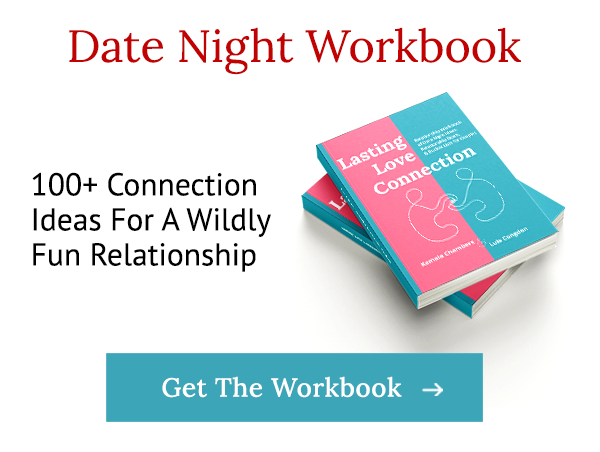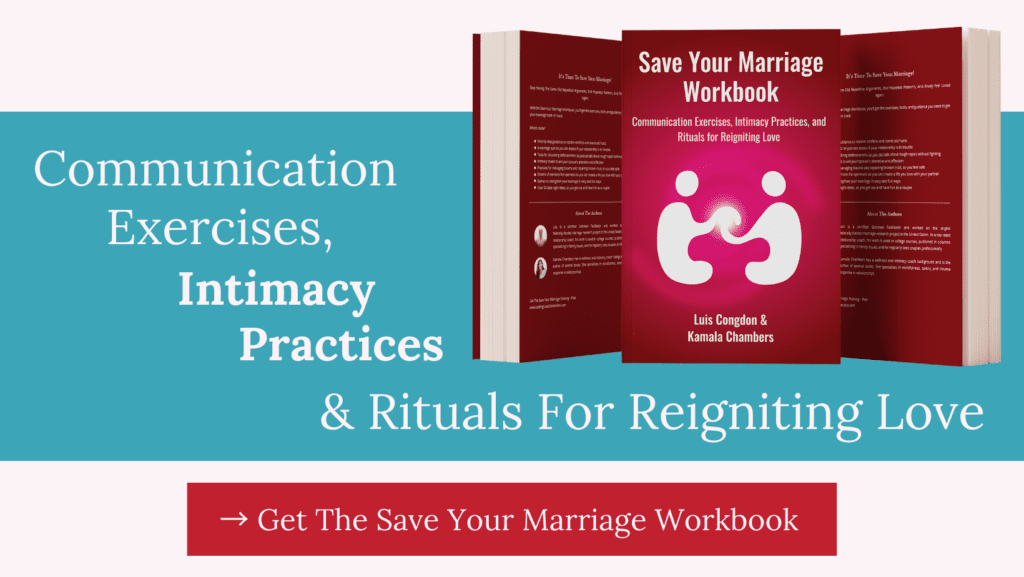If you say, “I think my husband hates me,” this article is for you. We’ll discuss why you might feel like your husband hates you and what to do about it.
Table of Contents
Why Do I Feel Like My Husband Hates Me?
First of all, even if you have a happy marriage, you may still find yourself thinking, “I think my husband hates me.” Or even, “Do I hate my husband?” As horrible as it might seem, these thoughts are not abnormal. Nor do they mean your marriage is bound for divorce. At times, spouses can’t connect.
One minute, you feel like you are getting along. The next, you feel like you never spend time together and only have negative emotions toward each other. Perhaps your husband is evening thinking, “My wife hates me. What do I do?”
So if you or your partner are wondering if your spouse hates you, you’re not alone. It is normal to feel hopeless in your marriage from time to time. Feeling disconnected from your husband hurts. It can cause you to feel worthless. So I’d invite you to consider that your husband doesn’t hate you. There may be other things going on beneath your relationship.
Why Does My Husband Act Like He Hates Me?
There may be several reasons your husband may be distant, cold, shut off, or expressing anger towards you. His distance might have a lot more to do with him than it does you. Your husband may be feeling overwhelmed, stressed, anxious, or societal pressures that cause him to lash out.
Resolving relationship problems with emotional safety
How Do I Know It’s Stress And Not Hatred?
Unfortunately, in intimate relationships, one person often feels the backlash of the other person’s stress. What seems like hatred might, in fact, be your husband’s inability to cope with what life is throwing at him.
1. There is a lack of physical intimacy between you.
If you and your husband are not having sex like you once did or lacking in physical affection, it may indicate that stress levels are unmanageable. Intimacy stops in a relationship when the mundane outweighs excitement and possibilities.
2. He spends time with toxic people and unhealthy friends.
We are the sum of the people we spend the most time with. So if your husband spends time with unhealthy people, their behaviors and habits may affect him. And in turn, those habits can impact how he treats you.
3. There are warning signs that he’s not attracted to you.
If it seems like your spouse is not attracted to you, you may interpret that as hatred. Watch out for the warning signs that your husband is not attracted to you.
Related Reading: How to Make My Husband Attracted To Me
4. He doesn’t talk with you or share his inner world.
Does it seem like your husband wants sex but not intimacy? Maybe he is emotionally distant and hesitant to open up. Unexpressed feelings can cause distance. Perhaps what seems like hatred may be unexpressed feelings bubbling within.
5. He has a low stress tolerance.
If it seems like your husband can’t handle stressors or lashes out when stressful situations or conversations happen, this may be due to feeling overwhelmed with stress already.
6. You lack quality time together.
You might feel like, “I think my husband hates me” because you don’t spend enough quality time together. However, your husband may lack enough downtime to process or take space from the stressors in his life. Therefore, you might do well to allow him time alone and schedule a date night so you can have set quality time together.

7. He isolates and shuts off.
If you feel like your husband hates you because he shuts you out, he may be closing off because he’s unable to cope with the stressful situations in his life.
8. He has a short fuse, lashes out, or gets angry often.
Hatred from your husband, in the form of blame and defensiveness, can be hard to deal with. His anger may be from stress and overwhelm, but that doesn’t make it okay. These behaviors can be dangerous because they can teeter towards abuse.
Related Reading: How To Make Your Husband Love You Again
How Do I Know If My Husband Hates Me?
You might feel your husband hates you because he is angry, cruel, or blames you. He may lash out in ways that leave you feeling worthless or unloved.
If you feel like your husband hates you because he displays signs of emotional or verbal abuse, seek help.

What is emotional abuse? Signs of emotional abuse
A note before reading these signs:
Many signs of emotional abuse signal a need for a couple to get extra support. Of course, healthy couples can have unhealthy behaviors, but the goal is to eliminate these toxic habits and trauma bonding.
So if you read the emotional abuse signs and think they happen a lot – please seek professional support.
You feel scared or unsafe.
You may question whether you are safe or not. Maybe you’re afraid to bring up complex issues because this may send your husband into a rage. All in all, you are afraid of his temper.
Being afraid or concerned about your partner’s temper doesn’t signal abuse per se, but it does indicate that you two need to work on communicating and managing escalated moments.
He may try isolating you from family and friends.
For example, your spouse may forbid you from interacting with certain friends or family members. In doing so, he keeps you under his control. Furthermore, you cannot seek reassurance or support for how your husband treats you.
This sign here is one you need to take extremely seriously. While some of these issues appear in all kinds of relationships, we take this very seriously. Get help right away if this one sticks out to you.
Your husband may be controlling, possessive, or jealous.
Your husband may insist on knowing where you are at all times. For example, he may demand the password to your computer. Or, he may go through your phone and review your contacts, calls, and text messages.
When we fight, my husband says he hates me
First, consider the possibility that your husband is using his words as a form of manipulation.
This form of coercive control can throw you off balance. In this way, he creates vulnerability in you and fear of losing the relationship. However, the more he does this, the more likely you will become submissive and do what he wants.
What is verbal abuse? Signs of verbal abuse
Verbal abuse is when someone uses words or derogatory comments to break a person down and control them.
If your husband is verbally abusive, you may begin to believe the negative things he says about you. As a result, you might beat yourself up, telling yourself you are worthless and always take the blame.
While many couples can get heated and name-call, it’s not healthy. If this happens, it doesn’t mean you need to leave, but take it as a serious sign that your conflict management needs extra support.
Related Reading: My Husband Doesn’t Listen To Me
Your husband belittles you.
He may not take what you say seriously. Your husband may doubt your ability to do anything. He might make you feel like you are incompetent.
As a result, you might need to depend on him more because you cannot depend on yourself. Being belittled will have bad results if it’s allowed to continue, leading wives to feel like they’re hated.
Your husband may shame or criticize you.
He may regularly put you down, even in front of friends and family. At times, he may even shame or humiliate you in public.
Your husband yells at you
If you find yourself saying, “My husband yells at me,” you may need to consider whether or not he is being verbally abusive.
Emotional abuse and verbal abuse are destructive and tear at the very fabric of your being. So if you are saying to yourself, “I think my husband hates me because he yells and says mean things”, this doesn’t mean he is abusive.
On the other hand, if your husband begins to hit, kick, slap, punch, or push you, this would be considered physical abuse. At this point, get help. If you feel you are in an abusive relationship, please reach out to the National Domestic Violence Hotline.
Other times feeling hatred is abusive, and you should call a domestic violence support expert
- Being forced to have sex when you don’t want it.
- You are being controlled physically.
- Your partner won’t allow you to get a job, have friends, or control your finances.
- You are worried your relationship is abusive (just the thought can be enough for you to encourage to call an expert; at the very least, you’ll get some insight).
Relationships with these issues can quickly become toxic. One danger of being in a toxic relationship is losing your health, which leads to low self-esteem, and the disconnect will grow between you. Here are a couple of things that can happen if you are involved in an abusive relationship:
Reactive Abuse
Reactive abuse is when the victim fights back and, thus, is labeled the abuser. For example, if an abuser calls their spouse names and is violent, they may feel the need to fight back. When this happens, domestic disputes begin.
For example, a husband or wife may hit their spouse. Then, in retaliation or self-defense, the victim might throw something at their spouse, escalating the fight. Ultimately, they are both fighting. As a result, the abuser says that the victim is abusing them.
Trauma Bonding
After a violent dispute, the victim will typically be hurt and upset in a trauma-bonding relationship. Under some circumstances, they may even call the police or yell for help. Ultimately, however, the victim will come to the perpetrator’s defense when it comes right down to it.
For instance, they may tell the police that they don’t want to press charges or try and convince bystanders that it was all a misunderstanding. Furthermore, if the abuser shows remorse, their spouse may forgive them and willingly return to them. But unfortunately, this remorse does not usually last, and eventually, the cycle begins again.
My Husband Hates Me – What Do I Do?
If you decide that he is not treating you in an abusive way but know you need help, we suggest you try to talk with your husband about working on improving the relationship.
Here are some steps you and your partner can take as outlined in the Save Your Marriage Workbook:
Steps to feel the love again in your marriage
- Create emotional safety so you can both openly talk.
- Learn how to communicate and manage conflict.
- Mend past hurts and heal old wounds.
- Increase the good times.
- Create marriage goals to help strengthen the relationship.
- Make time for intimacy.
- Get relationship support through couples counseling and couples coaching.
If you want to save your marriage, get support. Don’t try to tackle these issues alone. I highly encourage you to pick up the Save Your Marriage Workbook.







0 Comments